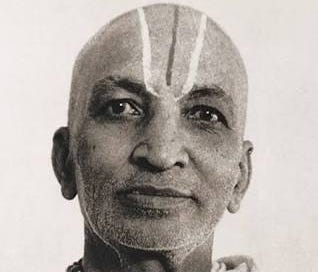Krishnamacharya, also known as the father of modern yoga, was a renowned Indian yoga teacher who played a pivotal role in the development and propagation of modern yoga.
He was born on November 18, 1888, in a village called Muchukundapuram, in the South Indian state of Karnataka. Krishnamacharya had his earlier education at his father’s Gurukulam (school). He lost his father at the age of 11 and continued his education at the Parakala Mutt, Mysore while simultaneously attending the Royal College of Mysore. At the age of eighteen, he moved to Benaras where he studied Sanskrit, logic, and grammar at the University. Then he came back to Mysore and received thorough teachings into the Vedanta philosophy under Sri Krishna Brahmatantra Swami. He secured at least 5 important degrees in Vedic education. He went to the Himalayas (Kailash Manasarovar) and learned yoga under Yogi Ramamohana Brahmachari. Krishnamacharya’s guru entrusted him with the charge of spreading the message of yoga.
Krishnamacharya's teachings were unique because he developed a style of yoga that was tailored to the individual student's needs. He believed that yoga should be adapted to suit the individual's physical, mental, and spiritual needs rather than forcing the student to adapt to a particular form of yoga. He believed that yoga was not just a physical practice but a way of life that included breathwork, meditation, and ethical practices.
Krishnamacharya's most famous students were B.K.S. Iyengar, K. Pattabhi Jois, and T.K.V. Desikachar. Each of these students went on to develop their unique styles of yoga and spread Krishnamacharya's teachings throughout the world.
Krishnamacharya's contribution to modern yoga was not limited to teaching. He also interpreted several books on yoga and philosophy, including "Yoga Makaranda," "Yoga Rahasya," and "Yoga Sutras of Patanjali." Krishnamacharya's writings are still considered essential texts for yoga practitioners worldwide.
Krishnamacharya's legacy lives on today through the many yoga styles that have evolved from his teachings, including Ashtanga, Iyengar, and Viniyoga. His approach to teaching yoga, which emphasized the importance of adapting yoga to suit the individual's needs, has become a fundamental principle of modern yoga practice.
Notable Facts
Krishnamacharya came from a family tradition of pursuing academic excellence and the scriptures. It would have been the expected path for him to become a great scholar well-versed in the Vedas. However, he chose to become a yoga teacher and spread the benefits of yoga. In fact in T.K.V.Desikachar, in his book The Heart of Yoga writes that his father turned down many offers of professorships in Sanskrit, logic, and Vedanta.
Krishnamacharya did a lot for the progression of women in yoga. The Yoga Rahasya is one of the first books which emphasises the importance of yoga for women. The well-known American yoga teacher Indra Devi was a student of Krishnamacharya.
Krishnamacharya had great belief in the healing and transformative power of yoga. He discovered the use of yoga in the treatment of sick people in Yoga Rahasya and the means of treatment varied from asana to mantra to pranayama to a change in diet.
Krishnamacharya insisted on attending to each student of yoga individually. He understood the uniqueness of each individual’s anatomy and physiology and accordingly addressed the issue resulting in healing. The focus was always on the person, the yoga practice would be tailored to fit the students instead of pushing the person to accommodate an existing structure. This can be seen as one of the first attempts at inclusivity and accessibility of the postures.
Krishnamacharya's contribution to the world of yoga is immeasurable. His teachings have inspired countless yoga teachers worldwide, and his legacy continues to live on today. His approach to teaching yoga, which emphasized the importance of individual needs and the integration of yoga into daily life, has made yoga accessible to people of all ages, backgrounds, and abilities. He will always be remembered as the father of modern yoga and a true yoga pioneer. We at SYZ strive to pay homage to his teachings and recognise the authentic roots of modern yoga.






